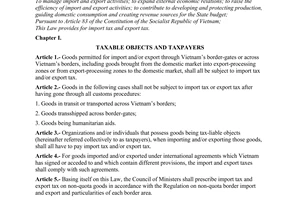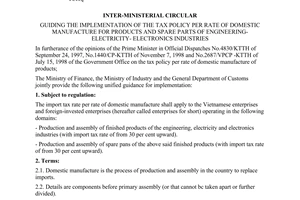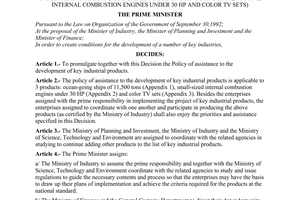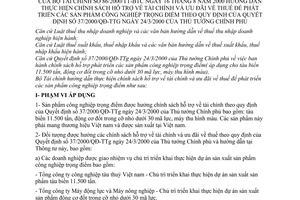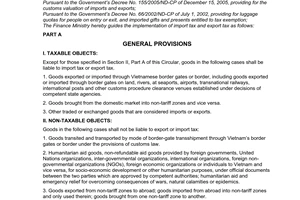Nội dung toàn văn Circular No. 86/2000/TT-BTC of August 16, 2000 guiding the implementation of the financial support and tax preference policies for the development of key industrial products under The Prime Minister’s Decision No. 37/2000/QD-TTg of March 24, 2000.
|
THE MINISTRY OF FINANCE |
SOCIALIST REPUBLIC OF VIET NAM |
|
No: 86/2000/TT-BTC |
Hanoi, August 16, 2000 |
CIRCULAR
GUIDING THE IMPLEMENTATION OF THE FINANCIAL SUPPORT AND TAX PREFERENCE POLICIES FOR THE DEVELOPMENT OF KEY INDUSTRIAL PRODUCTS UNDER THE PRIME MINISTER’S DECISION No. 37/2000/QD-TTg OF MARCH 24, 2000.
Pursuant to the Enterprise Income Tax Law and
the current guiding documents on enterprise income tax;
Pursuant to the Law on Import Tax and Export Tax and the current guiding
documents on import and export taxes;
Pursuant to the Prime Minister’s
Decision No. 37/2000/QD-TTg of March 24, 2000 promulgating the policy of
support to the development of key industrial products (applicable to
ocean-going ships of 11,500 tonnage, small-sized internal combustion engines of
under 30 HP and color TV sets),
The Ministry of Finance hereby guides the realization of the financial
support and tax preference policies for the development of key industrial
products as follows:
I. SCOPE OF APPLICATION
1. Key industrial products eligible for the financial support policy under the Prime Minister’s Decision No. 37/2000/QD-TTg of March 24, 2000 include: ocean-going ships of 11,5000 tonnage, small-sized internal combustion engines of under 30 HP and color TV sets. These products must bear Vietnamese trademarks and be made in Vietnam.
2. Subjects entitled to the financial support and tax preference policies under the Prime Minister’s Decision No. 37/2000/QD-TTg of March 24, 2000 and the guidance of the Circular include:
a/ Enterprises assigned the prime responsibility for deploying the implementation of the projects on production of key industrial products, including:
- The Vietnam Shipbuilding Corporation - to assume the prime responsibility for deploying the implementation of the project on building of ocean-shipping ships of 11,500 tonnage.
- The Vietnam Motors and Farming Machines - to assume the prime responsibility for deploying the implementation of the project on production of small-sized internal combustion engines of under 30 HP.
- The Hanoi Electronics Company - to assume the prime responsibility for deploying the implementation of the project on production of color TV sets.
b/ Enterprises that are assigned to participate in the production of key industrial products are those (regardless of domestic or foreign-invested enterprises) involved in the provision of supplies, raw materials, semi-finished products, details, spare parts’ (even to manufacturers of semi-finished products, details, spare parts…) for use in the production of key industrial products, which is certified by the Ministry of Industry.
The enterprises mentioned at Point 2 of this Section shall be only entitled to the preferential tax and land rental regimes under the guidance of this Circular when they are in the preference period and their manufactured products fully meet the criteria guided in the Industry Ministry’s Circular No. 03/2000/TT-BCN of May 31, 2000.
II. SPECIFIC PREFERENCE CONTENTS
A. TAX SUPPORT POLICY
1. Regarding enterprise income tax
a/ The preferential enterprise income tax rates applicable to the production of ocean-going ships of 11,500 tonnage, small-sized internal combustion engines and color TV sets prescribed in Appendices 1, 2 and 3 to the Prime Minister’s Decision No. 37/2000/QD-TTg of March 24, 2000 shall be realized as follows:
The incomes from the production of the above-mentioned key industrial products (including the production of supplies, raw materials, semi-finished products, details and spare parts to be supplied to enterprises with the prime responsibility for the projects on production of key industrial products) shall be entitled to the enterprise income tax rate of 25%, to tax exemption for two years from the time taxable incomes are generated and to a 50% reduction of the payable income tax amounts for two subsequent years.
b/ The enterprises mentioned at Point 2, Section I of this Circular shall be entitled to the preferential enterprise income tax rates under the guidance in this Circular only when they strictly adhere to the accounting and statistical regimes and manage to separately account the business results of the production of key industrial products (or the production of supplies, raw materials, semi-finished products, details and spare parts to be supplied to the enterprises with the prime responsibility for the projects on production of key industrial products).
The enterprise income tax rate of 25% shall apply during the period the enterprises enjoy the preferences as guided in the Industry Ministry’s Circular No. 03/2000/TT-BCN of May 31, 2000. After this preference period expires, the enterprises must declare and pay income tax at the rates prescribed in the Enterprise Income Tax Law. Besides the production of key industrial products (or the production of supplies, raw materials, semi-finished products, details and spare parts to be supplied to enterprises with the prime responsibility for the projects on production of key industrial products), which enjoys the tax rate of 25%, if the enterprises conduct other production and business activities, they shall still have to declare and pay enterprise income tax for these activities at the rates prescribed in the Enterprise Income Tax Law.
To have grounds for determination of enterprise income tax exemption or reduction amounts according to the regimes, the enterprises must send dossiers of application for tax exemption and/or reduction to the tax agencies directly managing them together with the declarations on the enterprise income tax amounts to be temporarily paid for the whole year. Such a dossier consists of:
- An application for tax exemption and reduction, clearly stating the reasons therefor and the proposed enterprise income tax amounts to be exempt and/or reduced (according to the projected amounts of the year of application for tax reduction).
- The project on the production of key industrial products already approved by the competent State body or the written certification by the Ministry of Industry (for enterprises participating in the production of key industrial products).
Basing themselves on the enterprises’ dossiers of application, the tax agencies shall examine and determine the enterprise income tax amounts temporarily exempted and/or reduced for the whole year, which shall be apportioned for each quarter. Quarterly, the tax agencies directly managing the enterprises shall effect the temporary exemption and/or reduction equal to 70% of the tax amounts to be temporarily paid every quarter for the incomes from the production of key industrial products (or the production of supplies, raw materials, semi-finished products, details and spare parts to be supplied to enterprises with the prime responsibility for the projects on production of key industrial products). The above temporary tax exemption and/or reduction must be clearly stated in the notice on payment of enterprise income tax.
At the year end, basing themselves on the financial settlement and the enterprise income tax settlement reports, the enterprises shall have to determine the official tax amounts to be exempt and/or reduced and collect data to expound in detail the business results of the production of key industrial products (or the production of supplies, raw materials, semi-finished products, details and spare parts to be supplied to enterprises with the prime responsibility for the projects on production of key industrial products) then send them to the tax agencies for use as basis for deciding the tax reduction amount for the year. The tax agencies shall check the enterprises’ reports and issue official decisions on the tax exemption or reduction amounts for the incomes from the production of key industrial products, which shall serve as basis for settling the enterprises’ enterprise income tax of the whole year.
Over the same duration if an enterprise is entitled to enterprise income tax preferences according to different regimes (the Enterprise Income Tax Law, the Domestic Investment Promotion Law and the Prime Minister’s Decision No. 37/2000/QD-TTg of March 24, 2000), it may opt for only one of the preferential regimes prescribed in the above-mentioned documents, which must be clearly stated in the written application for tax exemption and/or reduction.
2. Regarding import duty
a/ Exemption of import duty up to the end of December 31, 2003 for special-use equipment, machinery and transport means in the technological lines imported to create the enterprises’ fixed assets, which cannot be produced in the country yet, for the production of ocean-going ships of 11,5000 tonnage, small-sized internal combustion engines of under 30 HP and color TV sets (prescribed in Appendices 1, 2 and 3 to the Prime Minister’s Decision No. 37/2000/QD-TTg of March 24, 2000).
The exemption of import duty up to the end of December 31, 2003 for special-use equipment, machinery and transport means in the technological lines imported to create the enterprises� fixed assets, which cannot be produced in the country yet shall apply only to enterprises with the prime responsibility for deploying the implementation of the projects on production of key industrial products but not to enterprises participating therein. In special cases, enterprises participating in the production of key industrial products may be exempt from import duty on equipment and machinery which are imported only for the production of supplies, raw materials, semi-finished products, details and spare parts to be supplied to enterprises with the prime responsibility for implementing the projects, which is certified by the Ministry of Industry.
The list of special-use equipment, machinery and transport means in the technological lines imported to create the enterprises’ fixed assets, which cannot be produced in the country yet, to produce key industrial products, shall be drawn up on the basis of distinction from the list of special-use equipment, machinery and transport means already made in the country, issued by the Ministry of Planning and Investment.
b/ The exemption of import duty up to December 31, 2003 for supplies that need to be imported but cannot be produced in the country yet to produce ocean-going ships of 11,5000 tonnage, small-sized internal combustion engines of under 30 HP (prescribed in Appendices 1 and 2 to the Prime Minister’s Decision No. 37/2000/QD-TTg of March 24, 2000).
The list of supplies that need to be imported but cannot be produced in the country yet to produce ocean-going ships of 11,5000 tonnage, small-sized internal combustion engines of under 30 HP, shall be issued by the Ministry of Industry for each kind of product. In cases where a project on production of key industrial products has been deployed but the Ministry of Industry still fails to issue the list of supplies that need to be imported but cannot be produced in the country yet to produce key industrial products, the Ministry of Industry shall determine the list of duty-free supplies for each specific project.
c/ Particularly for supplies, components, details and spare parts imported to produce and/or assemble color TV sets, if the import duty thereon is calculated according to the localization ratio, they shall enjoy a priority index with an adjustment co-efficient of 0.5 for calculation of the import duty according to the localization ratio prescribed in Joint Circular No. 176/1998/TTLT of December 25, 1998 of the Ministry of Finance, the Ministry of Industry and the General Department of Customs, which shall be applicable only to the CIF import value of supplies, components, details and spare parts to produce color TV sets and spare parts thereof.
d/ After the competent bodies approve the projects on production of key industrial products, annually or periodically (quarterly, biannual and annual), the enterprises with the prime responsibility for implementing the projects on production of key industrial products must make production plans, lists of and plans on the import of special-use equipment, machinery and transport means in the technological lines to create the enterprises’ fixed assets as well as supplies that need to be imported but cannot be produced in the country yet, to produce key industrial products, and send them to the customs offices for registration of import duty exemption (particularly for enterprises participating in the production of key industrial products, their dossiers addressed to the Customs must be enclosed with the contracts for production and/or processing of supplies signed with the enterprises with the prime responsibility for the projects and the written certifications of the Ministry of Industry of such participation).
Basing themselves on the comparison between the lists issued by the Ministry of Planning and Investment and the Ministry of Industry (or the Industry Ministry’s certification of the lists of duty-free supplies for each project) and the enterprises’ registered lists, the customs offices shall temporarily refrain from collecting the import duty on goods actually imported by the enterprises. The importing enterprises must pay and settle the tax amounts which are actually exempt from payment into the State budget with the customs offices.
The tax agencies directly managing the enterprises shall have to oversee the import of special-use equipment, machinery and transport means and supplies imported duty free in the above-mentioned cases; if detecting cases of using imported goods for wrong purposes, they must collect all tax arrears and handle them according to the Law on Import Tax and Export Tax.
B. POLICY ON LAND RENT SUPPORT
The enterprises mentioned at Point 2, Section I of this Circular shall be entitled to the 50% reduction of the land rent payable into the State budget on the land area used for the production of key industrial products (or the production of supplies, semi-finished products, details, spare parts� used for the production of key industrial products) during the project implementation period already approved by the competent bodies or during the time they participate in the production of key industrial products (for enterprises that produce supplies, semi-finished products, details, spare parts’ used for the production of key industrial products).
In cases where an enterprise is unable to distinguish the land area used for the production of key industrial products (or the production of supplies, semi-finished products, details, spare parts’ used for the production of key industrial products) from the land area used for other business purposes, the determination of the land rent to be considered for reduction shall be based on the proportion between turnover from the production of key industrial products (or the production of supplies, semi-finished products, details, spare parts’ used for the production of key industrial products) and total turnover of the enterprise. If this ratio is lower than 30%, the level of 30% shall be used as basis for determining the land rent to be considered for reduction.
Example 1: In 2000, Enterprise A has a total of 100,000 m2 of land area rent from the State, of which 70,000 m2 is used for building warehouses and workshops for the production of color TV sets, the remaining area is used for other business purposes. Under the Prime Minister’s Decision No. 37/2000/QD-TTg of March 24, 2000 and the guidance in this Circular, Enterprise A shall be eligible for a 50% reduction of the land rent payable for 70,000 m2 of land used for the production of color TV sets. For the remaining land area of 30,000 m2, the enterprise shall have to pay land rent according to the prescribed regime.
Example 2: For the same Enterprise A, but it cannot distinguish the land area used for the production of color TV sets from the land area used for other business purposes. According to the 2000 financial settlement and tax settlement reports, the enterprise has a total business turnover of VND 100 billion and turnover of VND 40 billion from the production of color TV sets (accounting for 40% of total turnover) and the total land rent payable according to the regime is VND 50 million, the amount of land rent reduction under Decision No. 37/2000/QD-TTg shall be determined as follows:
The land rent reduction amount = VND 50,000,000 x 40% x 50% = VND 10,000,000.
Example 3: Also like example 2 above, turnover from the production of color TV sets is VND 25 billion (accounting for 25% of total turnover), the amount of land rent reduction under Decision No. 37/2000/QD-TTg shall be determined as follows
The land rent reduction amount = VND 50,000,000 x 30% x 50% = VND 7,500,000.
In cases where an enterprise is eligible for land rent reduction under the Prime Minister’s Decision No. 37/2000/QD-TTg of May 24, 2000 and also other prescribed regimes, it shall be entitled to land rent reduction and/or exemption according to either of the above regulations as they may choose.
The time for determination of land rent reduction shall be calculated in year. Particularly for the first year of project implementation, if the project implementation starts in the year’s first half, the time to be considered for land rent reduction shall be the whole year, if in the year’s second half the time to be considered for land rent reduction shall be six months.
The order and procedures for consideration of land rent reduction shall comply with the current regulations.
C. POLICY ON CAPITAL SUPPORT
The specific preferential levels for each key industrial product prescribed in Appendices 1, 2 and 3 issued together with the Prime Minister’s Decision No. 37/2000/QD-TTg shall apply. The procedures for allocating support capital from the budget and the procedures for borrowing the State’s development investment credit loans from the Development Support Fund shall comply with the current regime.
III. ORGANIZATION OF IMPLEMENTATION
This Circular takes effect from the date of its signing.
Any problems arising in the course of implementation should be reported by the units to the Ministry of Finance for guidance on the settlement thereof.
|
|
FOR THE MINISTER OF FINANCE |
